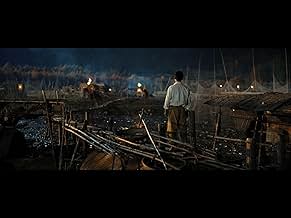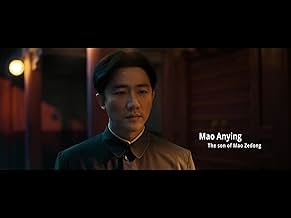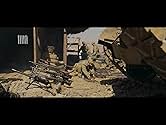PUNTUACIÓN EN IMDb
5,5/10
4,6 mil
TU PUNTUACIÓN
Una batalla épica de hace 71 años, cuando el Ejército Popular de Voluntarios entró en Corea del Norte. En condiciones extremas de frío, las tropas en el frente oriental lucharon, con espírit... Leer todoUna batalla épica de hace 71 años, cuando el Ejército Popular de Voluntarios entró en Corea del Norte. En condiciones extremas de frío, las tropas en el frente oriental lucharon, con espíritu intrépido y voluntad de hierro.Una batalla épica de hace 71 años, cuando el Ejército Popular de Voluntarios entró en Corea del Norte. En condiciones extremas de frío, las tropas en el frente oriental lucharon, con espíritu intrépido y voluntad de hierro.
- Premios
- 37 premios y 40 nominaciones en total
Reseñas destacadas
For a war movie, it is not bad, at least have some plots. The sad truth is that there is no winner in this war, that's why it's dragged for three years and no one can claim to be the winner. But since it's a movie, not a documentary, I don't think we need to discuss the truth or fiction here. However, many reviews are anti-China, I highly doubt those people ever watched the actual movie.
I looked through some of the comments of other people, including some who claimed to be history students. The history he studied may be just a profile.
First of all, it is really not a propaganda tool. I am sorry to say that the resistance of many Westerners to this movie. In real time, this is basically the real Chinese understanding of that period of history. Perhaps this reflects a huge difference in cognition.
Whether who won or lose, for the Chinese, that war is iconic. Before China was involved in the war, the Chinese government did repeatedly (15 times in my impression) not to cross the 38-degree line. However, no one listened to China's warnings. That's the in real history, and China have to engaged in the war which they did not want.
In the historical memory of the Chinese people, the general trend of the war is consistent with the movie. The mainstream view in China does not believe that China won the entire Korean War, but that China in that barren era achieved its strategic goals by virtue of its tenacious will.
And whether these characters are completely equivalent to the plot of the movie, we don't have to take it seriously. But for the Chinese, that war gave birth to many heroic deeds. These heroes and veterans will certainly magnify some facts in their memories, but they do represent the will of that era. But to a large extent, we can understand these plots as the Chinese collective memory of this period of history.
Friends who study history, if you really go to Afghanistan to see what happened there, you will find that they have their own historical memory. I think that in fact, no matter whether a country wins or loses, there are heroes. These countries and people should be given a chance to write their own heroes. In fact, many heroes may be just small people. Maybe they have gone through a certain period behind the flashlight. They are just the epitome of the times. If there were no movies and literary works, they might have been forgotten long ago.
What needs to be emphasized is that if you really understand China, China is very disgusted with war. China has experienced too many history and feelings that Westerners are not familiar with. On the contrary, China has great sympathy and empathy for countries and individuals who are in war or suffering.
Aside from this, the movie itself has a basic performance in addition to the mentally handicapped special effects, whether it is individual or as a whole.
Regarding the issue of actors, in fact, most people in China do not understand the meaning behind the expressions of foreigners, so they cannot judge the acting skills of Westerners, just like the Chinese faces in countless movies do not hinder Western judgments.
Maybe to you, the story of this movie is meaningless. But the story here does express others' understanding of the same period of history.
First of all, it is really not a propaganda tool. I am sorry to say that the resistance of many Westerners to this movie. In real time, this is basically the real Chinese understanding of that period of history. Perhaps this reflects a huge difference in cognition.
Whether who won or lose, for the Chinese, that war is iconic. Before China was involved in the war, the Chinese government did repeatedly (15 times in my impression) not to cross the 38-degree line. However, no one listened to China's warnings. That's the in real history, and China have to engaged in the war which they did not want.
In the historical memory of the Chinese people, the general trend of the war is consistent with the movie. The mainstream view in China does not believe that China won the entire Korean War, but that China in that barren era achieved its strategic goals by virtue of its tenacious will.
And whether these characters are completely equivalent to the plot of the movie, we don't have to take it seriously. But for the Chinese, that war gave birth to many heroic deeds. These heroes and veterans will certainly magnify some facts in their memories, but they do represent the will of that era. But to a large extent, we can understand these plots as the Chinese collective memory of this period of history.
Friends who study history, if you really go to Afghanistan to see what happened there, you will find that they have their own historical memory. I think that in fact, no matter whether a country wins or loses, there are heroes. These countries and people should be given a chance to write their own heroes. In fact, many heroes may be just small people. Maybe they have gone through a certain period behind the flashlight. They are just the epitome of the times. If there were no movies and literary works, they might have been forgotten long ago.
What needs to be emphasized is that if you really understand China, China is very disgusted with war. China has experienced too many history and feelings that Westerners are not familiar with. On the contrary, China has great sympathy and empathy for countries and individuals who are in war or suffering.
Aside from this, the movie itself has a basic performance in addition to the mentally handicapped special effects, whether it is individual or as a whole.
Regarding the issue of actors, in fact, most people in China do not understand the meaning behind the expressions of foreigners, so they cannot judge the acting skills of Westerners, just like the Chinese faces in countless movies do not hinder Western judgments.
Maybe to you, the story of this movie is meaningless. But the story here does express others' understanding of the same period of history.
All those 1-star review bombs are exposing the current climate of McCarthyist sinophobic hysteria in the west pretty accurately.
For anyone not suffering from McCarthyist hysteria, this is a decent movie with well-crafted, tense, and dramatic action scenes. It also does it's job of illustrating the theme of ordinary people being capable of extraordinary heroics feats and self-sacrifice when under existential threat.
Also, a good choice to feature Mao Anying's participation and death in the narrative. It showcases that the social class he was born in as Mao Zedong's son mattered nothing, because death is equal to all when fighting a war.
Less well done were the scenes of the American side. The directors and script writers did provide at least a couple of scenes of American soldiers talking about home life, and I thought this was a good choice to provide the American side with some humanity. But the actors were really chewing the scenery here, especially in their line delivery, which was unfortunate. I think, however, that this can mainly be attributed to the fact that these actors are far from being A-listers. Unfortunately, China still has not build up a decent pool of ethnically non-Asian quality actors, so I foresee more of this happening in the future.
Now a bit of historical context here on China's motives for partaking in this war: A few decades before the Korean War, China had been brutally invaded by imperial Japan through the Korean peninsula, which started off the theater of WW2 in the Far East. Given that this history was still fresh in the minds of the Chinese at the time, China was very sensitive to any happenings on the Korean peninsula. For that reason, they warned the American side multiple times not to cross the 38th parallel or they would force China's hand. The Americans thought the Chinese were bluffing and crossed that line anyway. This (and the American fleets that had gone to the Taiwan Straits in the summer of 1950) convinced the Chinese that the USA would try to invade and colonize China after taking control of the Korean peninsula. To preemptively stop this threat, China decided to set up the People's Volunteer Army to defend against the existential threat.
For anyone not suffering from McCarthyist hysteria, this is a decent movie with well-crafted, tense, and dramatic action scenes. It also does it's job of illustrating the theme of ordinary people being capable of extraordinary heroics feats and self-sacrifice when under existential threat.
Also, a good choice to feature Mao Anying's participation and death in the narrative. It showcases that the social class he was born in as Mao Zedong's son mattered nothing, because death is equal to all when fighting a war.
Less well done were the scenes of the American side. The directors and script writers did provide at least a couple of scenes of American soldiers talking about home life, and I thought this was a good choice to provide the American side with some humanity. But the actors were really chewing the scenery here, especially in their line delivery, which was unfortunate. I think, however, that this can mainly be attributed to the fact that these actors are far from being A-listers. Unfortunately, China still has not build up a decent pool of ethnically non-Asian quality actors, so I foresee more of this happening in the future.
Now a bit of historical context here on China's motives for partaking in this war: A few decades before the Korean War, China had been brutally invaded by imperial Japan through the Korean peninsula, which started off the theater of WW2 in the Far East. Given that this history was still fresh in the minds of the Chinese at the time, China was very sensitive to any happenings on the Korean peninsula. For that reason, they warned the American side multiple times not to cross the 38th parallel or they would force China's hand. The Americans thought the Chinese were bluffing and crossed that line anyway. This (and the American fleets that had gone to the Taiwan Straits in the summer of 1950) convinced the Chinese that the USA would try to invade and colonize China after taking control of the Korean peninsula. To preemptively stop this threat, China decided to set up the People's Volunteer Army to defend against the existential threat.
It's 1950. American forces have landed at Incheon and driving north towards the Chinese border. The politically ambitious warmongering American military leader Douglas MacArthur insists on bombing Chinese border locations to cut off supplies and retreat for the North Koreans. Chinese leader Mao decides to answer the provocation and sends in the PLA. They would confront the Americans at Lake Changjin. The Americans would call it, the Battle of the Chosin Reservoir.
I'm not going to argue for accuracy. There is a definite deliberate slant to its views but it's not overtly wrong. A perfect example happens quite early. Somebody gets CGI happy and puts in a sky full of American fighter planes. There is more chance of them flying into each other than bombing the right targets. It's insane how many planes are in the sky on their bombing run. It's like a WWII mass bombing raid except it's utter chaos. Something similar happens to the American characters with one exception. There is one heroic competent war leader. Otherwise, the Americans are mostly arrogant, fat, and throwing up his breakfast. It's a political slant to sell to the Chinese public. I would compare this to Pearl Harbor without the romance. It's not a good thing. The CGI is a micro-step down from that. The story is over-the-top melodrama. The film is using a lot of slow-motion action. The best war scene happens quite early with the soldiers faking dead on the dry river bed. If it stayed semi-realistic, this could have been good.
I'm not going to argue for accuracy. There is a definite deliberate slant to its views but it's not overtly wrong. A perfect example happens quite early. Somebody gets CGI happy and puts in a sky full of American fighter planes. There is more chance of them flying into each other than bombing the right targets. It's insane how many planes are in the sky on their bombing run. It's like a WWII mass bombing raid except it's utter chaos. Something similar happens to the American characters with one exception. There is one heroic competent war leader. Otherwise, the Americans are mostly arrogant, fat, and throwing up his breakfast. It's a political slant to sell to the Chinese public. I would compare this to Pearl Harbor without the romance. It's not a good thing. The CGI is a micro-step down from that. The story is over-the-top melodrama. The film is using a lot of slow-motion action. The best war scene happens quite early with the soldiers faking dead on the dry river bed. If it stayed semi-realistic, this could have been good.
Not a bad movie, a bit long but overall good.
PS: ignore the other reviews that give it a 1. I have seen so many 1 and 10 for a movie before. Bega me to think the 1 reviews are not objective about the movie, but personal feels.
PS: ignore the other reviews that give it a 1. I have seen so many 1 and 10 for a movie before. Bega me to think the 1 reviews are not objective about the movie, but personal feels.
¿Sabías que...?
- CuriosidadesUntil the last week of 2021, the highest-grossing film of the year and the highest-grossing film in Chinese cinema history as of 2021.
- ConexionesFeatured in Zomergasten: Garrie van Pinxteren (2024)
Selecciones populares
Inicia sesión para calificar y añadir a tu lista para recibir recomendaciones personalizadas
- How long is The Battle at Lake Changjin?Con tecnología de Alexa
Detalles
- Fecha de lanzamiento
- País de origen
- Idiomas
- Títulos en diferentes países
- The Battle at Lake Changjin
- Localizaciones del rodaje
- Empresas productoras
- Ver más compañías en los créditos en IMDbPro
Taquilla
- Presupuesto
- 200.000.000 US$ (estimación)
- Recaudación en Estados Unidos y Canadá
- 342.411 US$
- Fin de semana de estreno en EE. UU. y Canadá
- 105.768 US$
- 21 nov 2021
- Recaudación en todo el mundo
- 902.548.476 US$
- Duración2 horas 56 minutos
- Color
- Mezcla de sonido
- Relación de aspecto
- 2.39 : 1
Contribuir a esta página
Sugerir un cambio o añadir el contenido que falta

Principal laguna de datos
What is the German language plot outline for La batalla del lago Changjin (2021)?
Responde


































